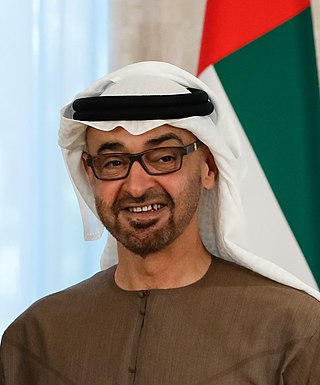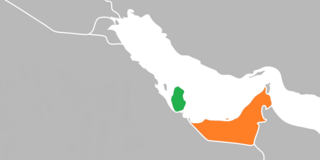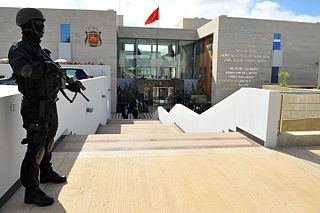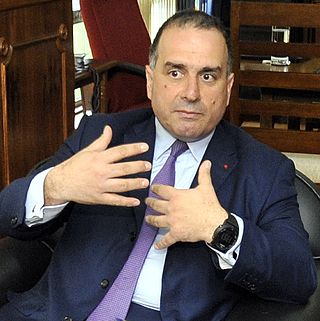Related Research Articles

In the 19th century France built a new French colonial empire second only to the British Empire. It was humiliated in the Franco-Prussian War of 1870–71, which marked the rise of Germany to dominance in Europe. France allied with Great Britain and Russia and was on the winning side of the First World War. Although it was initially easily defeated early in the Second World War, Free France, through its Free French Forces and the Resistance, continued to fight against the Axis powers as an Allied nation and was ultimately considered one of the victors of the war, as the allocation of a French occupation zone in Germany and West Berlin testifies, as well as the status of permanent member of the United Nations Security Council. It fought losing colonial wars in Indochina and Algeria. The Fourth Republic collapsed and the Fifth Republic began in 1958 to the present. Under Charles De Gaulle it tried to block American and British influence on the European community. Since 1945, France has been a founding member of the United Nations, of NATO, and of the European Coal and Steel Community. As a charter member of the United Nations, France holds one of the permanent seats in the Security Council and is a member of most of its specialized and related agencies.

The United Arab Emirates Armed Forces are the armed forces of the United Arab Emirates. They are also occasionally referred to as "Little Sparta", a nickname that was given by General James Mattis a former United States Armed Forces General and Secretary of Defense, due to their active and effective military role and power projection in the surrounding region compared to their relative size.

Sheikh Mohamed bin Zayed Al Nahyan, popularly known by his initials as MBZ, is an Emirati royal and politician who currently serves as the third president of the United Arab Emirates and the ruler of Abu Dhabi.
Hannibal Muammar Gaddafi is the fifth son of former Libyan leader Muammar Gaddafi and his second wife, Safia Farkash.
Lorenzo G. Vidino is an Italian-American writer on Islamism in Europe and North America, with a special focus on the Muslim Brotherhood. Since June 2015, he has headed the George Washington University Center for Cyber and Homeland Security's Program on Extremism.

Qatar and the United Arab Emirates (UAE) share a naval border and are part of the Arabic-speaking Persian Gulf region. They are both members of the GCC.
Mediapart is an independent French investigative online newspaper created in 2008 by Edwy Plenel, former editor-in-chief of Le Monde.

The Foundation for Defense of Democracies (FDD) is a 501(c)(3) non-profit think tank and a registered lobbying organization based in Washington, D.C., United States.
Institut Montaigne is a think tank based in Paris, France, founded in 2000. Institut Montaigne's makes public policy recommendations to advance its agenda, which broadly reflects that of the large French companies that fund it. It contracts experts from the French business community, academia, civil society and government.

The General Directorate for Territorial Surveillance, is the internal intelligence agency of the Moroccan state. It is tasked with the monitoring of potentially subversive domestic activities.
Qatar has been accused of allowing terror financiers to operate within its borders, which has been one of the justifications for the Qatar diplomatic crisis that started in 2017 and ended in 2021. In 2014, David S. Cohen, then United States Under Secretary of the Treasury for Terrorism and Financial Intelligence, accused Qatari authorities of allowing financiers who were on international blacklists to live freely in the country: "There are U.S.- and UN-designated terrorist financiers in Qatar that have not been acted against under Qatari law." Accusations come from a wide variety of sources including intelligence reports, government officials, and journalists.

Gérald Moussa Darmanin is a French politician who has been serving as Minister of the Interior in the governments of Prime Ministers Jean Castex and Élisabeth Borne since 2020.
The Qatar diplomatic crisis was a high-profile incident involving the deterioration of ties between Qatar and the Arab League between 2017 and 2021. It began when Saudi Arabia, the United Arab Emirates, Bahrain, and Egypt severed their bilateral relations with Qatar and subsequently banned Qatar-registered aircraft and Qatari ships from utilizing their sovereign territory by air, land, and sea; this involved the Saudis' closure of Qatar's only land crossing, initiating a de facto blockade of the country. Tensions between the two sides came to a close in January 2021, following a resolution between the Saudis and the Qataris.
The European Investigative Collaborations (EIC) network is a European collaborative hybrid project of transnational investigative journalism. EIC was established in the fall of 2015 with founding members, including Der Spiegel, El Mundo, Mediapart, the Romanian Centre for Investigative Journalism (CRJI), and Le Soir, and launched in the winter of 2016. On March 18, 2016, after three months research, they published the results of their first joint investigation spurred on by the 2015 terrorist attacks in Paris, in which they revealed how in spite of security risk warnings, "the EU’s freedom of goods policy facilitated the sale of weapons leading to [the 2015] terror attacks in Paris." In 2017 working with "over 60 journalists in 14 countries", the EIC published the Football Leaks—the "largest leak in sports history".
Terrorism in the United Arab Emirates describes the terrorist attacks in the United Arab Emirates, as well as steps taken by the Emirati government to counter the threat of terrorism. Although terrorist attacks are rare, the UAE has been listed as a place used by investors to raise funds to support militants in Afghanistan, Pakistan, and the financing of the September 11 attacks. Businesses based in the UAE have been implicated in the funding of the Taliban and the Haqqani network. In the 72nd session of the UN General assembly in New York, UAE foreign minister Abdullah bin Zayed Al Nahyan affirmed the United Arab Emirates policy of zero tolerance towards terrorism financing.
Tahnoun bin Zayed Al Nahyan is the son of Zayed bin Sultan Al Nahyan, the founder of the United Arab Emirates. Since 2016 he has served as the National Security Advisor of UAE. At the same time he manages a business portfolio, which supports national security interests and the UAE's opaque corporate sector. He chairs G42. The 2021 Pandora Papers revealed how he and his wife use shell companies to conceal their wealth.

Marwan Lahoud, born March 6, 1966, in Lebanon, is a naturalized French-Lebanese weapons engineer, living in France. He was deputy chief executive officer for strategy and marketing for the Airbus group until February 2017. In May 2017, he was appointed chairman of the supervisory board of OT-Morpho, a position he only held for a short time, even if he remained director for two years of different entities of this group, renamed from IDEMIA.
The Parquet national financier (PNF) is a French judicial institution proposed in late 2013 that is responsible for tracking down serious economic and financial crime. Since its installation on 1 March 2014, the financial public prosecutor deals with highly complex cases for which he has jurisdiction throughout France. Since 2019, it had been directed by Jean-François Bohnert.
Abu Dhabi Secrets is an international investigation series revealing the United Arab Emirates’ influence strategy in Europe, particularly in France, by financing a smear campaign to target opponents of the UAE, that is, Qatar and the Muslim Brotherhood.
Mario Brero is an Italian private detective heading five companies registered in Geneva, Switzerland. In 1989 he founded Alp Services SA, a private investigation business, focusing on banks, law firms and wealthy clients with "advice, support, strategic guidance, diplomatic intermediation and organisation in crisis management and image reputation" and with "national and international investigations and inquiries, notably commercial and financial, in combating money laundering, counterfeiting, parallel markets, economic and/or computer crime; surveillance and protection of individuals and companies, crisis and risk management, asset searches, due diligence, auditing.
References
- 1 2 Kirkpatrick, David D. (2023-03-27). "The Dirty Secrets of a Smear Campaign". The New Yorker. Retrieved 2023-08-27.
- ↑ Toscer, Olivier (2016-05-03). "Television: The hidden face of terrorism consultants". L’obs (in French). Retrieved 2023-08-27.
- ↑ "The 4 Truths: Roland Jacquard advocates a transformation of surveillance at European level". Francetvinfo.fr (in French). 2015-01-12. Retrieved 2023-08-27.
- 1 2 Krug, Francois (2015-12-02). "Who really are the terrorism experts we see everywhere?". Le Monde (in French). Retrieved 2023-08-27.
- ↑ "Jean Picollec". Reuters. 2022-02-01. Retrieved 2023-08-27.
- ↑ "Arrêt sur images". www.arretsurimages.net.
- ↑ "The Oslo attack, Al-Qaeda and the failures of the Western media". Kapitalis (in French). 2011-07-26. Retrieved 2023-08-27.
- ↑
- Fayol, Clément; Philippin, Yann; Rouget, Antton; Harari, Antoine (2023-07-13). "ONU, Qatar, Macron : les opérations secrètes du Sheikh Matar, agent des Émirats". Mediapart (in French). Retrieved 2023-08-27.
- Philippin, Yann; Rouget, Antton (2023-03-01). "Une fuite de données révèle l'ingérence des Émirats en France". Mediapart (in French). Retrieved 2023-08-27.
- Philippin, Yann; Rouget, Antton (2023-03-04). "Leaked data shows extent of UAE's meddling in France". Mediapart. Retrieved 2023-08-27.
- Fayol, Clément; Philippin, Yann; Rouget, Antton; Harari, Antoine (2023-07-07). "Plus de 200 Français ont été fichés pour le compte des services secrets des Émirats arabes unis". Mediapart (in French). Retrieved 2023-08-27.